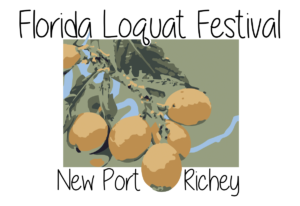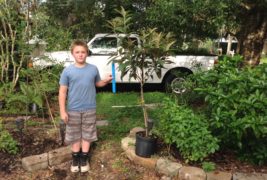Florida Loquat Festival News – No. 30
September 2018
Celebrating Florida’s Urban Fruit
An Ecology Florida/Friendship Farms & Fare Annual Event
Florida Loquat News

The Newsletter of The Florida Loquat Festival
No. 30
September 10, 2018
ANNUAL LABOR DAY EDITION
Published by Ecology Florida and Friendship Farms & Fare
First Flowers Edition Florida Loquat News
Loquat Flower Bouquet at East Madison Orchard
Budding and Flowering Season Well Along
Early Varieties in Bloom
Rainy Summer May Have Been Helpful
Budding and Flowering Season Well Along
If you were growing loquats in the 2018-2019 season, some of your trees may have buds and blooms by now. If not now, look for them soon. At our main orchard, East Madison Groves and Friends Farms, about half our trees have buds or blooms. Let us know how you are doing with your trees. Look for more details on the growing season later in the News.
Sixth Annual Loquat Festival
March 23, 2019
Frances Avenue Park
New Port Richey Florida
Mark Your Calendars & Tell Your Friends
March 23, 2019
Planning is well along for next year’s festival, with a tentative date of March 23, 2019 (9:00 a.m. to 2:00 p.m.), Frances Avenue Park, New Port Richey Florida. The program will be 10:00 a.m. to 2:00 p.m.
Remember: This is the only loquat festival in Florida – and we believe it is the only one in the United States. It is the only one that we know about.
New features are planned for 2019, and future editions of the News will give details. If you would like to volunteer to assist with the event, please let us know as soon as possible.
We are looking for harvesters, canners, and bakers. Let us know if you are interested. We also welcome folks who will donate the harvest of their trees.
We are also looking for folks to prepare and sell preserves, and baked goods. As many of you know, one of the traditions of the Loquat Festival is selling out of all the jellies, jams, compotes, canned halves and slices, and baked goods (cookies, muffins, breads). That is a tradition we would like to bring to an end in 2019.
Needless to say, preparing loquat food products is a great way to supplement one’s income – and it makes a real contribution to creating a sustainable culture.
We are all reminded that the Loquat Festival is a celebration of seasonal fruit grown in and around the Springs Coast Watershed. The quantity of fruit at the festival is based largely on regionally available production. Later in this edition, will be further details on the 2018 – 2019 growing season where we stand looking ahead to the 2019 festival.
Subscribe to Loquat News and Tell a Friend
Go to the Ecology Florida website to sign up for Loquat News. If you know of others who might like to learn more about the loquat and our festival, send them the link.
We publish Loquat News periodically – 4-6 times a year (sometimes more). The News has updates on the festival and the seasonal progression of the trees. We like to share reports from folks who are nurturing trees on their property. From time to time we’ll feature growers, grove curators, nurseries, and preserve producers. You might see an editorial from time to time, and even a little whimsy.
Here’s how to reach us and enter a subscription
https://tarrylane.wixsite.com/friendship
http://www.ecologyflorida.org/contact-ecology-florida/
Growers’ Update – Labor Day Review
2018-2019 Flowering Report
Advance Notes for 2018-2019
First Buds Appear July 2, 2018
First Flowers Appear July 22, 2018
Labor Day is a good time to assess the status of fruit development. Labor Day marks the end of the rainy season and the start of the dry season. By Labor Day, trees have full foliage, and many trees will have buds and flowers. We had a near normal rainy season at the major orchards (East Madison and Friendship Farms), and it appears to have been close to normal throughout our prime harvest area – the Springs Coast Watershed and Tampa Bay Region. As a result, our trees are very healthy and producing abundant buds and flowers. Please let us know how your trees are doing.
As we enter the dry season, be alert to the health of your trees. Most should do fine without special irrigation – unless the fall is usually hot and dry. This is certainly a possibility, with climate change becoming ever more pronounced – so stay alert!
At the main orchards, we do not irrigate after trees are established (about a year) – except during extreme droughts, which we had in 2016-2017. We also do not fertilize, although we know those who do. Our experience is that loquats thrive without extra water or fertilizer – this is part of what we find so appealing about Florida’s Urban Fruit.
What to look for in the next few months: more buds, flowers, and first fruitlings. By now, new leaves put out in the early spring are beginning to mature. Buds should be appearing on all trees, with many also flowering. About half the trees in our two orchards are budding and flowering now.
By the end of September, look for the first fruitlings, and look for the first ripe fruit by early to mid-December.
Once flowering starts, it continues throughout the summer and into the fall, which means significant fruiting will begin as early as late fall and continue through early spring – with a single tree often bearing fruit for two to three months.
The first fruitlings should appear a little more than a month after the first flowers. We’ve noted that development tends to vary, which we attribute to weather conditions and increasing heat due to global warming. In our experience, above normal heat, lack of rain, and arid conditions (as in the 2016-2017 season) seem to accelerate maturation and quantity of fruit. In contrast, more rain, overcast conditions, and cooler temperatures slow maturation and quantity of fruit.
This year, we have had near normal rainfall but temperatures have been well above normal. Most days we have been two to four degrees above normal. We will see how the trees fair under these conditions. Hot and dry weather usually augers heavy fruit production. So, we will be interested in how hot and wet weather effects fruit production. We look forward to a fruitful year.
As noted elsewhere in the News, please write to us about your experiences. What varieties are you growing, how is the fruiting cycle transpiring with your tree(s), is this a heavy year? Send us an image of your tree.
Seed Starts and Seedlings: wait two months. One of the more persistent questions we receive concerns germination of loquat seeds. In our experience, seeds from locally established varieties of loquat trees germinate in just about two months. Almost like clockwork, two months after planting the seed, the first tender shoot appears. Also, on the basis of our experience, trees grown from seed mature and produce true to their parent. Cultivars are another issue, and seeds from them may not germinate.
The main guidance given here is to give the seeds at least two months to germinate. To be sure, we suggest waiting three months. So many have reported being dissatisfied with their seeds not germinating, only to learn that they gave up weeks before germination would have occurred.
Update on “Spring Hill Giant” (2017) Every harvest, we select seeds for starting at the nursery from the trees that produce abundant, large, and healthy fruit. In 2017, we selected seeds from a beautiful tree in Spring Hill. The variety was not identified, but we suspect it is a Gold Nugget or Bradenton – but it could also be a hybrid, as are many of the trees that flourish in the Springs Coast Watershed.
We are dubbing it “Spring Hill Giant.” We planted ten seeds in our seeding mix on March 27, 2017 and the first sprout appeared on May 29, 2017. See note, above, on the typical two-month germination period. Of the ten seeds planted, as of this issue (early September 2019), our little collection features saplings about two feet high with unusually large leaves.
Looking For Trees? – We Have Them!
We often are contacted by folks who desire to purchase loquat trees. We are happy to report that we can accommodate most requests. Give us a call or send an email, and we’ll let you know what we have available. Right now, we have several cultivars, and even more seed-grown East Madisons. Friendship Farms & Fare is a registered nursery and licensed seed seller in the state of Florida.
Besides loquats, Friendship Farms Nursery offers heirloom seeds, a variety of Florida-acclimated seeds from our seed bank, seasonal seedlings, and native pollinator plants. Loquats are our specialty, and we have them in various sizes and many named varieties. Check with us first before going to a commercial nursery or big box store.
Loquat Archives
We are compiling a booklet with archival articles on the loquat in Florida. The booklet will contain the two articles recently discovered by our researchers – Isabelle Krome’s 1936 article, “Louqats,” and John Popenone’s 1960 article “Evaluation of Loquats.” We have releases on these articles.
We are also seeking release from Winthrop Packard’s reflection on loquats in his famous 1910 book, Florida Trails. As an additional feature, we are including Dell deChant’s essay, “The Loquat’s Cultural Context.”
We expect the booklet to be available later this year, with a suggested donation of $10.00. Let us know if you’d be interested.
Commercial Potential of Loquats
We remain convinced of the excellent business opportunities available for enterprising folks who want to develop commercial ventures using loquats. Our festival has shown us that there is a market for a wide range of loquat products – from fresh fruit during the season, trees year round, to pies and other pastries (including cookies!) – and of course, preserves of all varieties. Harvesters could also prosper during fruiting season, and growers and cultivators throughout the year.
Loquats may be just the answer for some of the many folks who are looking for more sustainable endeavors, or just meaningful work. There is no question that a market for loquats exists – the Florida Loquat Festival proves that. Equally clear is that as of now that market has hardly been developed. Let us know if you are planning to pursue the commercial potential of loquats. We’ll publicize your endeavors, and feature your project at next year’s festival.
Support Opportunities Available
If you or your business would like to support next year’s festival, please let us know, and we’ll send you our supporter package. You can contact us through the Ecology Florida website. If you leave a phone number, we’ll give you a call.
http://www.ecologyflorida.org/contact-ecology-florida/
http://www.ecologyflorida.org/
Thank You
Your interest and support of loquats and the Florida Loquat Festival is appreciated. Thanks for being part of our mission to increase awareness, appreciation, and use of “Florida’s Urban Fruit.”
Please share this newsletter with others you know. For information on supporting our work, see the contact addresses and link earlier in the newsletter, and below.
Established 2014
Next Year’s Festival March 23, 2019
Founded and Sponsored by
Friendship Farms & Fare affirms and advances agrarian ideals to reestablish a sustainable culture
https://tarrylane.wixsite.com/friendship
Ecology Florida advances the harmonious integration of healthy natural, cultural, and economic ecologies to regenerate a sustainable world
http://www.ecologyflorida.org/


Leave a Reply